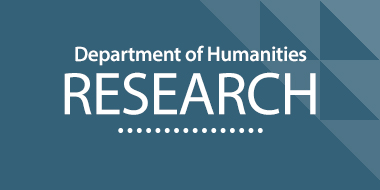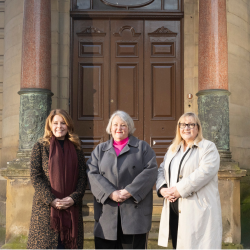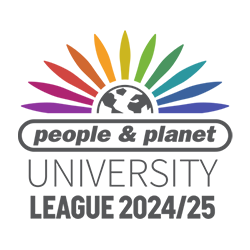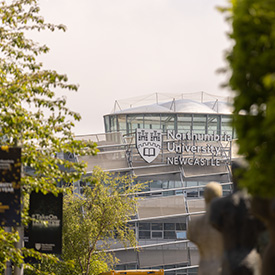-
Study
-
Undergraduate
- Search for a Course
- Undergraduate Open Day & Events
- Application Guides
- Northumbria University UCAS Exhibitions
- Foundation Years
- Undergraduate Fees & Funding
- School & College Outreach
- Continuing Professional Development
-
Postgraduate
- Postgraduate Study Degree
- Postgraduate Research Degrees
- Postgraduate Open Days and Events
- Postgraduate Fees & Funding
- Flexible Learning
- Thinking about a Masters?
- Continuing Professional Development
- Change Direction
-
Student Life
- The Hub - Student Blog
- Accommodation
- Life in Newcastle
- Support for Students
- Careers
- Information for Parents
- Students' Union
- Northumbria Sport
- Be Part of It
-
-
International
International
Northumbria’s global footprint touches every continent across the world, through our global partnerships across 17 institutions in 10 countries, to our 277,000 strong alumni community and 150 recruitment partners – we prepare our students for the challenges of tomorrow. Discover more about how to join Northumbria’s global family or our partnerships.
View our Global Footprint-
Applying to Northumbria
- European Union
- Our London Campus
- Northumbria Pathway
- International Events
- Entry Requirement and Education Country Agents
- Global Offices
-
Northumbria Language Centre
- Faculty Requirements
- Acceptable English Requirements
- Pre-sessional English Language and Study Skills
- Academic Language Skills Programmes (ALS)
-
International Fees, Funding & Scholarships
- International Undergraduate Fees
- International Undergraduate Funding
- International Masters Fees
- International Masters Funding
- International Postgraduate Research Fees
- International Postgraduate Research Funding
- International Money Matters
-
Life at Northumbria
- International student support
- Careers
-
International Mobility
- Current Northumbria Students
- Incoming Exchange Students
-
-
Business
Business
The world is changing faster than ever before. The future is there to be won by organisations who find ways to turn today's possibilities into tomorrows competitive edge. In a connected world, collaboration can be the key to success.
More on our Business Services -
Research
Research
Northumbria is a research-rich, business-focused, professional university with a global reputation for academic quality. We conduct ground-breaking research that is responsive to the science & technology, health & well being, economic and social and arts & cultural needs for the communities
Discover more about our Research -
About Us
-
About Northumbria
- Our Strategy
- Our Staff
- Place and Partnerships
- Student Profiles
- Alumni Profiles
- Leadership & Governance
- Academic Departments
- University Services
- History of Northumbria
- Contact us
- Online Shop
-
-
Alumni
Alumni
Northumbria University is renowned for the calibre of its business-ready graduates. Our alumni network has over 246,000 graduates based in 178 countries worldwide in a range of sectors, our alumni are making a real impact on the world.
Our Alumni - Work For Us
What will I learn on this module?
The tiny countries of Central America form a narrow land bridge between the continents of North and South America. For centuries a quiet
backwater, the region gained international importance in the twentieth century, thanks to the United States’ growing interest in its ‘backyard’ to
the south.
In this module, you will explore Central America’s tumultuous twentieth century via a variety of primary sources. You will use US military
archives to explore the US occupation of Nicaragua from 1912 to 1933, and discover how historians have used oral history to rescue
memories of the El Salvadoran massacre of 1932. In the second half of the course, you will look at how ideas about development intersected
with U.S. informal empire in the region, using CIA and State Department documents to uncover the roots of the civil wars which wracked the
isthmus in the 1980s. Finally, you will learn about the controversy surrounding Rigoberta Menchú’s memoir of the Guatemalan civil war, and
consider how historians navigate conflicting documents and imperfect, contested memories to create credible accounts of past events.
How will I learn on this module?
You will learn on this module by attending lectures and seminars. The lectures will introduce you to the module’s core themes and key
historiographical debates related to the subject area. For the weekly seminars, you will be expected to undertake the required reading
(available via the electronic reading list) and sample the recommended reading. You will build on your independent reading by contributing
ideas and arguments to seminar discussions with your peers. Seminar discussions will incorporate both large and small group discussions,
built around focused questions on relevant themes and topics. Seminars will also include significant engagement with carefully selected
primary sources. You will receive formative feedback throughout the learning process and summative assessment will match your learning
against the learning outcomes for the module.
How will I be supported academically on this module?
Your academic development will be supported through your module tutor, engagement with your peers, and through the programme leader.
The module tutor will be accessible within publicised Feedback and Consultation hours and via email. Your peers will provide you with a
collaborative learning environment, and your programme leader will guide you through the requirements and expectations of your degree
programme, of which this module is part. You will also be supported through individual engagement with the academic literature, lectures, and
resources available on the eLP. Formative feedback will be on-going through seminar activities and assessment tasks.
What will I be expected to read on this module?
All modules at Northumbria include a range of reading materials that students are expected to engage with. Online reading lists (provided after enrolment) give you access to your reading material for your modules. The Library works in partnership with your module tutors to ensure you have access to the material that you need.
What will I be expected to achieve?
Knowledge & Understanding: 1. Knowledge and understanding of the history of twentieth-century Central America, and particularly the role played by discourses of development. 2. Display an understanding of events in more than one Central American country. Intellectual / Professional skills & abilities: 3. Demonstrate a range of transferable skills, including the ability to make independent critical judgements, to critically evaluate sources, to summarise the research of others, and to present arguments in a cogent and persuasive way. Personal Values Attributes (Global / Cultural awareness, Ethics, Curiosity) (PVA): 4. Awareness of the historical origins of Central America’s current challenges. 5. Curiosity about the nature of evidence on which our knowledge of the past, and therefore our understandings of the present, depend.
How will I be assessed?
You will write two essays of 2,500 words each. Each assignment will make up half of your overall grade. The first essay will normally be dedicated to one specific country, (MLO 1, 3, 4, 5), while the second essay will deal with comparative or international questions (MLO 1-5). Formative feedback for each assessment will be provided in seminars. Verbal and written feedback will be given on all summative assessed work. Feedback on initial summative assessments will enable you to improve on later ones.
Pre-requisite(s)
N/A
Co-requisite(s)
N/A
Module abstract
For centuries a quiet backwater, the tiny countries of Central America gained international importance in the twentieth century, thanks to the
United States’ growing interest in its ‘backyard’ to the south. In this module you will explore twentieth century Central America via a range of
primary sources. You will use US military archives to explore the US occupation of Nicaragua and discover how oral history has rescued
memories of the El Salvadoran massacre of 1932. In the second half of the course you will look at how ideas about development intersected
with U.S. informal empire in the region, using CIA documents to uncover the roots of the civil wars which wracked the isthmus in the 1980s.
Finally, you will learn about the controversy surrounding Rigoberta Menchú’s memoir of the Guatemalan civil war, and consider how
historians navigate conflicting documents and imperfect, contested memories to create credible accounts of past events.
Course info
UCAS Code T700
Credits 20
Level of Study Undergraduate
Mode of Study 3 years Full Time or 4 years with a placement (sandwich)/study abroad
Department Humanities
Location City Campus, Northumbria University
City Newcastle
Start September 2025
All information is accurate at the time of sharing.
Full time Courses are primarily delivered via on-campus face to face learning but could include elements of online learning. Most courses run as planned and as promoted on our website and via our marketing materials, but if there are any substantial changes (as determined by the Competition and Markets Authority) to a course or there is the potential that course may be withdrawn, we will notify all affected applicants as soon as possible with advice and guidance regarding their options. It is also important to be aware that optional modules listed on course pages may be subject to change depending on uptake numbers each year.
Contact time is subject to increase or decrease in line with possible restrictions imposed by the government or the University in the interest of maintaining the health and safety and wellbeing of students, staff, and visitors if this is deemed necessary in future.
Useful Links
Find out about our distinctive approach at
www.northumbria.ac.uk/exp
Admissions Terms and Conditions
northumbria.ac.uk/terms
Fees and Funding
northumbria.ac.uk/fees
Admissions Policy
northumbria.ac.uk/adpolicy
Admissions Complaints Policy
northumbria.ac.uk/complaints














